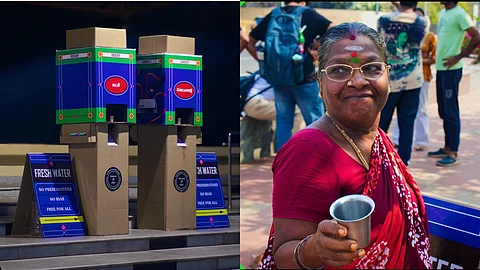
- HOMEGROWN WORLD
- #HGCREATORS
- #HGEXPLORE
- #HGVOICES
- #HGSHOP
- CAREERS
- ABOUT US
- CONTACT US

As a first-time voter in Chennai, I experienced a whirlwind of emotions and thoughts swirling inside my head. It's the biggest decision of the year, requiring careful thought, research, and introspection. We find ourselves peering into the depths of our current political, economic, and social landscapes; recognising the opportunity and responsibility we hold to contribute meaningfully.
Whether a first-time voter or not, Arundhati Rajan has created a project that can help us deal with our critical thinking structures and patterns to make the ‘more correct’ choice for our nation, which we hope to find ourselves doing on the polling day. This ongoing venture, ‘Chennai Votes: People vs Ideology’, seeks to shut out the noise and foster a more informed and engaged citizenry through playful experiences.
The project's core concept is deceptively simple. Participants encounter two water dispensers. As they choose from which to quench their thirst, the stark difference in water levels speaks volumes about their subconscious political mindset. This seemingly lighthearted interaction serves a dual purpose. It not only encourages introspection and discussion but also gathers valuable data.
Arundhati’s project offers a refreshing approach. 'People vs Ideology' delves deeper than a mere headcount. By conducting the experiment in diverse locations across Chennai, Rajan aims to understand how gendered spaces influence political attitudes. The project collects data on age, gender, and location; creating an intersectional lens. This allows researchers to analyse how these factors shape an individual's political outlook. It asks questions such as, "Does a young woman in a marketplace approach politics differently than an older man in a quiet residential area?"
The project confronts a critical challenge: representing uncertainty in a world dominated by definitive pronouncements. Political discourse often thrives on absolutes; leaving little room for nuance. ‘People vs Ideology’ seeks to disrupt this trend. By focusing on the water dispensers, the project acknowledges the inherent ambiguity in political choice. The act of choosing isn't always a clear-cut declaration; it can be influenced by subconscious biases and situational factors.
‘People vs Ideology’ goes beyond quantitative data collection. Playful interaction with the water dispensers evokes emotions and sparks conversations. This qualitative data – the discussions, the hesitations, the unspoken – holds immense power, which allows for a deeper understanding of the thought processes behind political decisions.
The project paves the way for future explorations in data representation. The water dispensers themselves can be seen as 'Data Objects' — everyday items imbued with the power to communicate complex information. This approach opens doors for designers to create new ways of visualizing and interacting with data.
‘People vs Ideology’ emphasizes the importance of design that is reflexive. The project also acknowledges the constantly shifting political landscape and adapts its methods accordingly. This ensures that the data collected remains relevant and insightful. The project also highlights the need to identify underrepresented voices. By analyzing current datasets for gaps, researchers can tailor future experiments to capture a more complete picture of the electorate.
Ultimately, 'People vs Ideology' reminds us of the power of play. By engaging with data in a playful and exploratory way, the project fosters emotional connections that can lead to a deeper understanding of our political process as a whole. Furthermore, the ability to reinterpret the data embedded in the object encourages ongoing dialogue and critical thinking. This, in turn, empowers individuals to cast informed votes and become truly active participants in the political process.
Follow the mastermind behind this project, Arundathi Rajan, here.
If you enjoyed reading this, here's more from Homegrown:
What We Owe To Each Other: Why I Changed My Mind About Voting In India
The 2024 General Elections: A Step-By-Step Breakdown Of How To Register To Vote In India
Decoding Democracy: An Easy Guide To The 2024 Indian General Elections
